
Menzies and Fadden lose office and Curtin becomes Prime Minister
The Advisory War Council meeting of 14 August 1941 heard a lengthy report from Robert Menzies on his Cabinet's decision requesting him to travel back to London as Prime Minister to represent the Commonwealth in Churchill's War Cabinet. Menzies, having been back in Australia less than three months, was anxious to go. His insistence would precipitate his downfall.
Curtin initially gave what appeared to be qualified approval for the trip, but a week later the Labor Party's executive was unanimously opposed, declaring that because of the gravity of the war, it was essential for Australia to have the Prime Minister in the country to direct the total war effort. 31
Menzies renewed his efforts to encourage the Labor Party to share power in a joint national government, but his offers were rejected. When he called an emergency Cabinet meeting, a majority of his ministers agreed that a new leader was needed. On 29 August Menzies resigned the prime ministership.
Arthur Fadden was elected Prime Minister by the coalition of the United Australia Party and the Country Party. Fadden and Curtin continued their close co-operation.
The balance of power in the House of Representatives was on a knife edge. On 3 October Fadden's Coalition Government was defeated on the floor of the House by 36 votes to 33 when two Independents abandoned the coalition and voted with the Labor Party. Fadden resigned and led the conservatives into Opposition. John Curtin took office as Prime Minister on 7 October as war with Japan loomed. 32
Tatsuo Kawai cabled the new Prime Minister:
'Congratulations for your splendid victory which put on you great responsibilities of wartime Australia. I trust you for the improvement of Pacific relations.'
Curtin responded:
'I hope your best wishes will be realised.' 33
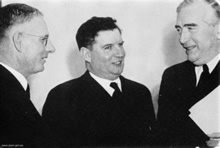
Three Prime Ministers within two months: John Curtin, Arthur Fadden and Robert Menzies.
Courtesy the Australian War Memorial,
042826.
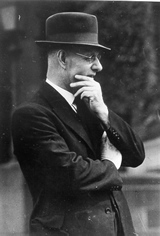
Prime Minister John Curtin, 1942.
Records of the Curtin Family. JCPML00376/138.
Fatal steps to conflict
Curtin's political good fortune in gaining the prime ministership was accompanied by the grimmest of news in relation to Japan. Australia was ill-prepared for a new war closer to home. In late October, the commander in chief, Home Forces, Lieutenant-General Sir Iven Mackay, reported that Australia was:
'...virtually naked, militarily... because all I can see is more than 12,000 miles of Australian coastline, and so little wherewithal for defending the points that really matter.' 34
Japan, now suffering from severe trade sanctions that amounted to an economic blockade, was already planning for war. By early November the Imperial Army was demanding that diplomatic talks in Washington be broken off to allow it to go to war before it was too late. The Army estimated that if the blockade continued, Japan would be out of petroleum by mid-1942.
An Imperial Conference before Emperor Hirohito on 5 November agreed that negotiations be carried on with the United States with the expectation of immediate war if the talks failed. On the same day, orders were issued for a naval air attack on Pearl Harbor to coincide with attacks and invasions elsewhere, including in Malaya, the Philippines, Guam, Wake and Hong Kong. 35
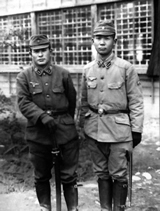
Tatsu Kawai's son Masumi (right),
ca. 1943 - 1945. Photograph from the Kawai family collection at Manazuru. JCPML01224/56.
As Western sanctions began to bite, Prime Minister Hideki Tojo ominously told the Diet in Tokyo on 17 November:
'One hardly needs to explain that an economic blockade, as between non-belligerents, constitutes a measure little less hostile in character than armed warfare.' 36
As Opposition leader, Curtin's confidential discussions with Kawai took place with the full knowledge and concurrence of Prime Minister Menzies. Now as Prime Minister, Curtin maintained the contact, entertaining Kawai to dinner at The Lodge in Canberra. But soon he began to hand over the confidential discussion with Kawai to his Minister for External Affairs, Herbert Evatt.
Evatt's relationship with Kawai was on an even more amicable basis than Curtin's and Evatt was now in frequent, urgent meetings with the Japanese envoy. Evatt privately had much sympathy for Japan's plight and for the lack of international processes for Japan to address grievances, following Japan's withdrawal from the League of Nations. Even after the Japanese advance into southern Indochina and just ten days before war with Japan was declared, Evatt told Parliament:
'In these very difficult times, I consider it to be my duty to pay tribute to the frank and friendly attitude of the Japanese Minister in this country.' 37
A Japanese deadline of 25 November for an agreement in talks with the US passed without resolution. A large carrier based Japanese task force set sail from Hitokappu Bay in the remote Kurile islands on 26 November. Its destination was a point north of Hawaii from where the carriers launched their aircraft to attack Pearl Harbor.
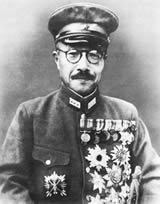
Japanese Prime Minister Hideki Tojo.
Courtesy Wikipedia.
![External Affairs Minister Evatt addresses the House while PM (next left) thoughtfully listens [n.d.]. JCPML00376/91.](pics/JCPML00376_91s.jpg)
External Affairs Minister Evatt addresses the House while PM Curtin thoughtfully listens [n.d.]. Records of the Curtin Family. JCPML00376/91.
An extraordinary warning in Canberra
On Saturday 29 November 1941, with the Japanese strike force ploughing through heavy seas towards Hawaii, Tatsuo Kawai entered Parliament House. Walking past the House of Representatives chamber, he was escorted into the Prime Minister's office. Gavin Long, a journalist who would later become an official historian, quoted John Curtin relating in the same office what occurred in this brief but extraordinary meeting:
'Kawai sat in that chair nine days before the war began and said: "I'm afraid it has gone too far; the momentum is too great." Not long after that I knew that they were burning papers at the Japanese Minister's office.' 38
Curtin's wife Elsie years later also recalled her husband's meeting with 'an unnamed Japanese official':
'"Dad" remarked [that] he hoped there would be no war with Japan. "I fear the momentum may have gone too far" the official said. Those few words gave "Dad" a flying start. He immediately called a Cabinet meeting, checked with all the banks the amount of Japanese-held money in the country, called for a report on all Japanese ships in Australian waters and started a detailed report of all Japanese nationals in the country.' 39
Walter Murdoch (later Sir) was a founding professor at the University of Western Australia. He was a friend of Curtin from his days as Opposition leader. Professor Murdoch in 1952 wrote that prior to the outbreak of war with Japan, Curtin 'kept up his intimacy with Kawai to the last possible moment', with each man striving to find ways to preserve the peace:
'Kawai was too loyal to give away any secrets; but it was a remark of his, inadvertently let fall, that prompted Curtin to set telephones at work to find out, from all Australian ports, what was happening to Japanese shipping. When he found that Japanese ships were everywhere leaving port, he cabled a warning to the American Naval Office.
'A curt cable came back to the effect that the Navy Office was quite aware of all that was happening. Its complacency was rudely shaken when, a few weeks later, Pearl Harbor occurred. The story was told to me by Mr Curtin himself...'
No record of such a warning by Curtin has ever been found, despite attempts by Australian official war historians. 40
After leaving Curtin's office, Kawai paid an unusual visit to the Lodge to see Curtin's wife, Elsie, whom he admired. Perhaps he believed they might never meet again. Kawai left a copy of his controversial book of 1938, The Goal of Japanese Expansion. It was as though he wanted Elsie Curtin to understand why his nation was going to war.
Kawai later would accurately say that he knew nothing about the proposed attack on Pearl Harbor. Japan's diplomatic missions were warned of a potential breakdown of talks with the Americans and of a likely resulting conflict, although details were withheld from overseas envoys. 41
Three days after meeting Curtin and with war imminent, Kawai held another of his sumptuous dinners at his residence in Melbourne. The guests this time included the former Prime Minister Robert Menzies and his wife Pattie (later Dame). The probabilities are that he gave Menzies the same dire prediction of imminent war as he had to Curtin. 42

Prime Minister's office in Parliament House.
Courtesy of the National Archives of Australia, CP491, A3560, 3432.
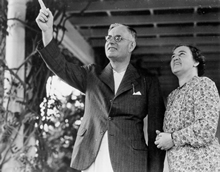
John and Elsie Curtin at PM's
Lodge, Canberra. 1942.
Records of the Curtin Family. JCPML00376/30.
![[Pattie and Sir Robert Menzies walking along a street], ca 1940s. Courtesy National Library of Australia.](pics/nla_pattie_menzies.jpg)
Pattie and Prime Minister Robert Menzies walking along a street, ca 1940s.
Courtesy of the National Library of Australia, bib ID vn3307907, call no. PIC/9112/3.